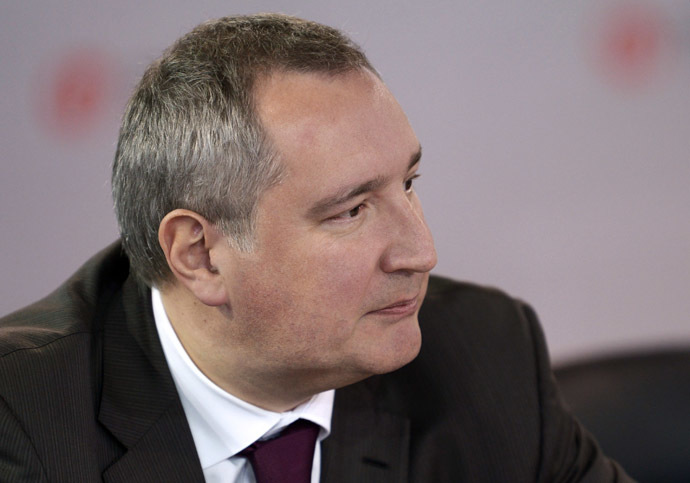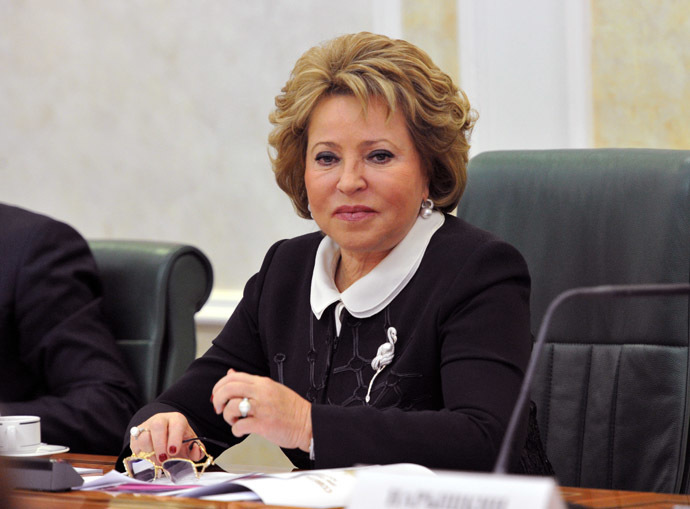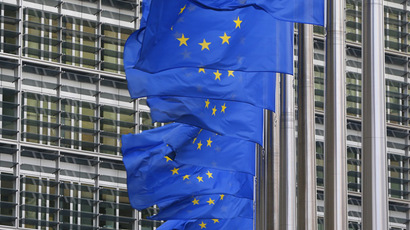Russia’s deputy PM, two presidential aides added to EU black list
Deputy Prime Minister Dmitry Rogozin, two presidential aides and two members of the Crimean administration are among the 12 Russian officials who were added to the European Union’s black list on Friday.
The decision made by EU leaders in Brussels bars them from
entering the European Union as a retaliation for their support of
Crimea’s push to withdraw from Ukraine and be reinstated as part
of Russia.
The accounts of the blacklisted officials in European banks – if
any are found – will also be frozen.
The EU’s new list is headlined by Dmitry Rogozin, Russia’s deputy
prime minister in charge of the defense industry and former
ambassador to NATO, who is followed by Vladimir Putin’s advisors,
Sergey Glazyev and Vladislav Surkov.
The other Russians on the EU’s blacklist include the speakers of
both upper and lower houses of the country’s parliament,
Valentina Matvienko and Sergey Naryshkin, as well as State Duma
deputy, Elena Mizulina, who is known for initiating the law
banning gay propaganda to minors.
The European politicians also sanctioned three Russian military
officials in the Crimea – the deputy commanders of the Black Sea
Fleet, Aleksandr Nosatov and Valery Kulikov, as well as
Colonel-General Igor Turchenyuk, who heads the Russian troops
deployed in Crimea.

Two Crimean electoral officials, Mikhail Malyshev and Valery
Medvedev, who organized a referendum, in which some 96 percent of
the Crimea voted for reuniting with Russia, were also banned.
The list is completed by TV presenter and head of Rossiya
Segodnya state news agency, Dmitry Kiselyov, who made a number of
controversial comments on the events in Ukraine and Russia’s
relations with the West.
The announcement brings the number of Russians citizens targeted
by the EU travel ban and asset freezes to 33 people.
However, the blacklisted Russian officials didn’t seem to be too
impressed by the European sanction.
“All these sanctions aren’t worth a grain of sand of the
Crimean land that returned to Russia,” Rogozin wrote on his
Twitter page.
Malyshev, who heads the Crimea’s Central Electoral Committee,
said that “he didn’t plan to travel to the EU anytime
soon.”

The Russian Foreign Ministry has once again denounced the
sanctions against these Russian citizens, calling them groundless
and counterproductive.
“Sanctions and any restrictive measures are viewed by us as
unlawful, illegal and illegitimate,” Konstantin Dolgov, the
Russian Foreign Ministry’s commissioner for human rights, told
RIA-Novosti. “And, of course, they are clearly
counterproductive in terms of building relations between Russia
and the EU, and Russia and the United States in the case of US
sanctions.”
The EU’s sanction announcement follows similar moves by the US on
Thursday, which saw Obama’s administration blacklisting another
20 of Russia’s top officials and businessmen.
The EU and its top economy, Germany, are too closely connected
with Russia to switch from banning individuals to actual economic
sanctions, Daniel McAdams, executive director at the Ron Paul
Institute, told RT.
“If there were any sanctions that would do physical economic
harm they would boomerang because the world is
interconnected,” he said. “The US trades less with
Russia than Germany does. Germany is a very important partner to
the East. Germany is already shouldering the burden of the EU
that’s bankrupt. Although [Chancellor Angela] Merkel is making a
lot of tough noises, can she really afford to destroy what's left
of the German economy?”
“So I’ don’t think there’s much more they can do with these
sanctions. That’s probably why you (Russia) seem to be mocking it
a bit,” McAdams added.
On Friday, the Crimea and Sevastopol, which chose to withdraw
from Ukraine, officially joined Russia, with President Putin
signing the finalizing decree.
Previously, Russian lawmakers ratified both the amendment and an
international treaty with the Crimea and the city of Sevastopol,
which the sides signed in the Kremlin on March 18.














